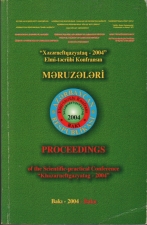Archive
Articles / FISCAL ASPECTS OF RENT ATTITUDES IN THE NATIONAL OIL AND GAS EXTRACTION COMPLEX

04.02.2012
E.M.Hajizadeh
Azerbaijan Republic, Azerbaijan State Economic University /ASEU/
Optimization of rent attitudes in a national oil and gas extraction complex remains to one of complex fiscal questions. At the given stage in theAzerbaijanRepublicuse of a trade zone and formation of district of legal relations is adjusted by corresponding laws: «About bowels», «The Ground code», «The Tax code» and others the specification certificates. Dominating over fiscal priorities in «The Tax code» with the slightest functional difference is fixed to collect from petrogetters on adequate essence two rent substantial - the ground and trade tax. Kilometer operational space on land which makes approximately equal half of general territory of republic is known, that 43,1 thousand, as a result of long extensive and intensive extraction the mountain-geological condition was aggravated, energy of layers is practically exhausted, the potential of stocks and manufacture is exhausted has passed on a late stage.
Financial problems, deterioration of fund of chinks and the trade equipment became additional obstacles for normal maintenance of profitability of a facilities. In such difficultly mountain-economic situation at the bowels of users to collect simultaneously ground and trade tax in turn even more limit normal functioning manufacture. On the other hand the collected taxes from the operational zone, distinguished in the parameters, high groundcapacity, ecological difficulty and inflammability, it is not differentiated and not реinvested on reproduction.
Investigating rent attitudes of deposits on land it is necessary to not forget, that under republican legislations the Azerbaijan sector of Caspian sea which makes 78,8 thousand km2 the areas, also is a rent zone and accordingly demands effectively and a steady regulation.
Empirical realities are those, that the trade tax in strategrafhy and a geographical cut takes into account a level of development and arrangement of a deposit, a difference of depths, quantity and quality of stocks, productivity of extraction, affinity to the markets, and in water area and on a sea-bottom the rent area, thickness of water, navigation-communication opportunities and other economic components and conditionality.
In republic with a multilateral geographical relief and it is various structures of hydrocarbonic deposits, the fiscal policy in the field of the rent also should start with natural properties of object, applying thus the exclusive approach to each concrete deposit.
The lead profactorial analysis shows, that in the country with the richest oil-and-gas resources it is necessary to improve the tax laws and permit system. To soften to the specification and to differentiate rent payments, in particular on the old areas where extraction is fewdebit and manufacture is on recession of a stage. For the beginning on inevitability to carry out general inventory and purposeful audit of all industrial potential and resources, to adapt in universal standards statutory acts, having resulted all the parties of a consensus to develop system of rent indicators and corresponding branch methodology. In normalization of system of rent attitudes in a national oil and gas extraction complex between the state and the bowels the user to not carry out a geologist-economic estimation of a deposit and the sum of rent payments following from it through the tax mechanism, and to include the license agreement. To define size of the mountain rent for full of profitability not on the basis of a transfer, and real market prices, to transfer the basic part of tax burden from manufacture of extraction in sphere of processing and selling.
86.Fiscal aspects of rent relations in national oil and gas extraction complex. InternationalEasternOilAcademy, Ministry for Fuel and Energy of Azerbaijan Republic, SSRDI «Gipromorneftegaz», Ministry of Education ofAzerbaijanRepublic, State oil Company of Azerbaijan Republic.BakuStateUniversity, SRI «Geotechnological Problems of Oil, Gas & Chemistry». «Khazarneftgazyatag - 2004» Scientific-Practical Conference.Baku. 2004. 0,5 v.q.





